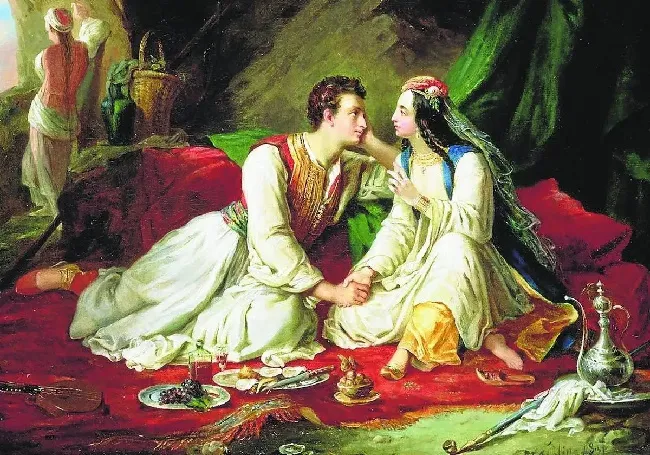Se están cumpliendo hoy 200 años de la muerte de quizás la figura más emblemática del romanticismo inglés: Lord Byron, así conocido quien se llamara George Gordon Byron, fallecido el 19 de abril de 1824, a los 36 años en Grecia, durante su participación en el movimiento armado por la independencia de ese país, entonces bajo el poderío otomano.
El relieve de Byron en la literatura, tanto de su época como posteriormente, es sumamente reconocido, pero también como referencia de vida para jóvenes imbuidos en la rebeldía que él representó en su tiempo. Fue autor de una obra narrativa de gran importancia y también de destacados textos poéticos. No me detendré mucho en su figura y obra por haberlo hecho en dos posts anteriores cuando traté el romanticismo inglés, que pueden consultar en los siguientes enlaces: 1 y 2. Esta vez solo haré alusión a dos poemas suyos.
Today marks the 200th anniversary of the death of perhaps the most emblematic figure of English romanticism: Lord Byron, known as George Gordon Byron, who died on April 19, 1824, at the age of 36 in Greece, during his participation in the armed movement for the independence of that country, then under Ottoman rule.
Byron's prominence in literature, both in his time and later, is recognized, but also as a reference of life for young people imbued with the rebelliousness he represented in his time. He was the author of a narrative work of great interest and also of outstanding poetic texts. I will not dwell much on his figure and work because I have done it in two previous posts when I dealt with English romanticism, which you can consult in the following links: 1 and 2. This time I will only allude to two of his poems.

No volveremos a vagar
Así es, no volveremos a vagar
Tan tarde en la noche,
Aunque el corazón siga amando
Y la luna conserve el mismo brillo.Pues la espada gasta su vaina,
Y el alma desgasta el pecho,
Y el corazón debe detenerse a respirar,
Y aún el amor debe descansar.Aunque la noche fue hecha para amar,
Y demasiado pronto vuelven los días,
Aún así no volveremos a vagar
A la luz de la luna.
So, we'll go no more a roving
So late into the night,
Though the heart be still as loving,
And the moon be still as bright.For the sword outwears its sheath,
And the soul wears out the breast,
And the hearth must pause to breathe,
And love itself have rest.Though the night was made for loving,
And the days return too soon,
Yet we'll go no more a roving
By the light of the moon.
En contraste con el espíritu aventurero y hasta turbulento que pareciera ser característico de la personalidad de Byron, encontramos en este poema a un hablante que declara su recogimiento, su entrega a la serenidad de la noche, como quien retorna del fragor de la vida, especialmente de la amorosa. Lo hace con sencillas, pero significativas imágenes, entre las que destaca la luz de la luna.
In contrast to the adventurous and even turbulent spirit that seems to be characteristic of Byron's personality, we find in this poem a speaker who declares his recollection, his surrender to the serenity of the night, as one who returns from the din of life, especially of love. He does so with simple but significant images, among which the moonlight stands out.

Camina bella
Camina bella, como la noche
De climas despejados y cielos estrellados;
Y todo lo mejor de la oscuridad y de la luz
Se reúne en su aspecto y en sus ojos:
Enriquecida así por esa tierna luz
Que el cielo niega al vulgar día.Una sombra de más, un rayo de menos,
Habría mermado la gracia sin nombre
Que se agita en cada trenza de negro brillo,
O ilumina suavemente su rostro;
Donde pensamientos serenamente dulces expresan
Cuán pura, cuán adorable es su morada.Y en esa mejilla, y sobre esa frente,
Son tan suaves, tan tranquilas, y a la vez elocuentes,
Las sonrisas que vencen, los tintes que brillan,
Y hablan de días vividos en bondad,
Una mente en paz con todo,
¡Un corazón cuyo amor es inocente!
She walks in beauty, like the night
Of cloudless climes and starry skies;
And all that's best of dark and bright
Meet in her aspect and her eyes:
Thus mellow'd to that tender light
Wich heaven to gaudy day denies.One shade the more, one ray the less,
Had half impair'd the nameless grace
Which waves in every raven tress,
Or softly lightens o'er her face;
Where thoughts serenely sweet express
How pure, how dear their dwelling place.And on that cheek, and o'er that brow,
So soft, so calm, yet elocuent,
The smiles that win, the tints that glow,
But tell of days in goodness spent,
A mind at peace with all below,
A heart whose love is innocent!
Un elocuente canto a la belleza inocente, como bien declara al final, condensada en una hermosa mujer joven a la que el hablante poeta enaltece, con voz delicada. En la contemplación de su caminar en la noche, en consonancia con esta, su hermosa y casi sagrada belleza se entrega a la mirada gozosa del poeta, quien la describe con una sensorialidad llena de analogías con la naturaleza.
An eloquent hymn to innocent beauty, as it is well declared at the end, condensed in a beautiful young woman whom the poet praises with a delicate voice. In the contemplation of her walk in the night, in consonance with it, her beautiful and almost sacred beauty surrenders to the joyful gaze of the poet, who describes her with a sensoriality full of analogies with nature.
Referencias | References:
https://es.wikipedia.org/wiki/Lord_Byron
https://en.wikipedia.org/wiki/Lord_Byron
https://www.dim.uchile.cl/~anmoreir/escritos/byron.html
http://amediavoz.com/byron.htm





